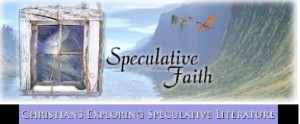Christian Speculative Fiction – Where Does It Start, Where Does It End?
 In response to guest author John Olson’s post, “Speculative Marketing: Re-imagining Reality,” I wrote a comment that revealed something about me, something I don’t usually tell the Spec Faith crowd: I don’t feel weird. That in itself makes me weird, however, since many vocal spec faith readers and writers see themselves as a group apart.
In response to guest author John Olson’s post, “Speculative Marketing: Re-imagining Reality,” I wrote a comment that revealed something about me, something I don’t usually tell the Spec Faith crowd: I don’t feel weird. That in itself makes me weird, however, since many vocal spec faith readers and writers see themselves as a group apart.
I was a “mainstream” reader before I was ever a fantasy reader. To exacerbate matters, I don’t really like science fiction, though like other genres, I find that some titles will captivate me. The upshot is, I often don’t feel like I fit with speculative groups. Yet I write fantasy, so I don’t feel as if I fit with mainstream groups. I truly am weird.
But as I also mentioned in my comment to John’s post, I’ve discovered that I’m not as alone as I thought. There are other fantasy or sci fi lovers who do not feel as if they are outside the mainstream. In fact, they love to read good books. Period.
Then there is the Christian aspect of Christian speculative fiction. Not long ago “Christian fiction” was considered a genre produced exclusively by Christian publishing houses. Times are changing. A growing number of Christian authors feel compelled to write for the general market. Their place in “Christian speculative fiction,” then, is uncertain, at least in some people’s minds.
Perhaps we need two distinct categories — Christian speculative fiction as a genre and Christians who read and write speculative fiction.
Not so long ago, in the article “Imagination And Truth,” I suggested that Christian fiction (of any genre) should be defined as stories that speak the truth about God:
And here is the point that separates Christian fiction, I believe, from all other fiction. Christian fiction speaks the truth about God. Other fiction can speak the truth about morals or the way the world works or what makes a person love or hate or live on the edge. Other fiction might be silent about God. Other fiction might speak a lie (though undoubtedly the author believes that what he’s written is true) about any of these things. Only Christian fiction speaks the truth about God. [Emphasis added this time around 😉 ]
Given that definition, Christian fiction can be found in all kinds of places — in ebooks, books published by traditional Christian publishing houses, self-published books, books put out by general market publishers, books published by small or independent presses.
In addition, a number of Christians are writing about people and society from a Christian worldview. They aren’t actually saying anything about God — not overtly or allegorically, though perhaps obliquely and by implication. Veronica Roth, author of Divergent comes to mind as such a writer. She states on her blog that she is a Christian:
I’m also a graduate of Northwestern University, a Chicago-suburb resident, a Christian, and A Tall Person, among other things.
Besides her blog description, Veronica makes a clear statement of faith on the acknowledgments page in Divergent. Yet her book, I understand, deals with a dystopian society and doesn’t include God. Does she or doesn’t she belong in amongst those identifying with “Christian speculative fiction”?
Certainly that’s for her to decide, but I’d say emphatically she belongs with Christians who love speculative fiction.
I personally would like to see a broader community emerge — one in which readers and writers support and encourage quality speculative fiction wherever we find it.
 I have seen great strides made among Christian publishers in the last seven years since Spec Faith 1.0 was first conceived (you’re currently at the 2.0 version). I’ve also seen organizations like the Lost Genre Guild crop up, and small publishers like Marcher Lord Press and Splashdown Books come into being with the intent to make more Christian speculative fiction available.
I have seen great strides made among Christian publishers in the last seven years since Spec Faith 1.0 was first conceived (you’re currently at the 2.0 version). I’ve also seen organizations like the Lost Genre Guild crop up, and small publishers like Marcher Lord Press and Splashdown Books come into being with the intent to make more Christian speculative fiction available.
Somehow our efforts seem scattered, however. Just today I visited the site of a Christian speculative fiction writer I “met” on Facebook. In her sidebar is a list of “Author Friends,” and I didn’t know a one. Perhaps they aren’t all speculative writers, or maybe none of them is. But I frequently happen upon other speculative writers not involved in any of the groups I know.
If for no other reason than to pray for each other, I think it would be great to have a place for Christians who love speculative fiction to “congregate.” I don’t, however, think we need to separate from the mainstream.
Goodness — Veronica Roth’s book debuted at number six on the New York Times bestseller list, which of necessity puts her squarely in the mainstream. Are we to say she doesn’t belong in our little niche of Christian speculative fiction because she’s too popular? Or because she isn’t writing about God? I say, she’s a Christian with a Christian witness writing speculative fiction and those of us who care about our genre should be excited to see her doing what she is doing. We should also be supporting her in prayer, even as we should Jeff Gerke or John Olson or any other Christian who writes or publishes what we want to read.
Possibly getting Christians who love speculative fiction together will prove to be much like herding cats. I’d still like to see us try — I’d like to see a support system of some sort, for readers and writers, for Christians writing Christian speculative fiction and Christians writing speculative fiction. I’d like to see us create a stir for the books that we love and ultimately for the God who makes it possible.









































See, I am wierd and proud of it, and carefully notching my geek belt.
I heard somewhere that ‘weird’ once meant ‘skilled in witchcraft’ (which definitely makes the line from Hamlet more sensible). Which version are we going with?
Definately in the nutso, not cool, type of wierd
So now you think you’re the Doctor? 🙂
Embrace the weirdness, Becky.
Oddly enough, I don’t really think in terms of genre. I do like ‘weird,’ but in my head genre itself is something of a curtain, stage, lights, and soundboard that I get to add set, actors, costumes, and props to.
I get that way sometimes, but for other reasons.
Only if the writer is right in his theology and his fiction doesn’t contradict said theology.
Heh heh. Herding cats.
I do think there is truth to the “strength in numbers” adage.
I also think you just sold a book for Veronica! 🙂
@Kaci Here is my answer…
Amy: Cool aliens?
Doctor: What do you call me?
Amy: An alien.
Just because I’m afraid I was the one who gave you the impression that Veronica Roth’s world in Divergent doesn’t include God, I’d like to correct that notion. She has a couple of characters who are Christians and the implication is that there are more Christians in the world than the ones we know. She doesn’t go into great detail about what these people believe about God, but they pray before their meals. The book is not selling Christianity, by any means. But it’s obvious that some of the people in the book believe in God.
Now that, that’s cleared up…great post. Yes, lets support and pray for one another. I’m all for that.
[…] have another book on my to-read list. Discovered it today over at Speculative Faith. There’s no need for me to advertise for the book, since it’s already made it to the […]
Ooo, I liked your post 🙂 And I liked your definition of Christian speculative fiction. I think it also comes down to the audience we are writing for. I sat on the fence for years, wondering which side my book belonged (CBA or ABA). Then it hit me one day. If asked to remove the Christian elements of this particular series, I would not. Its not a salvation story, its a story set in a fantasy setting about the cost and choice of following God. This series is for a Christian audience.
However, I have another story I will begin working on after this series. Its not heavily Christian and I actually don’t have any plans for it to be (at least not yet). So it could go to either audience.
And then I have a YA in the back of my head that is not Christian at all (just a clean story). I told my son about it and he loved it, so I’ll probably write it someday too 🙂
All that to say, we are all different writers writing to different people. And one group is not better than the other (those writing for CBA or ABA). In fact, supporting each other is a great idea 🙂
I definitely think we need to somehow come together in an extended, supportive community. I fought for 10 years to have my book published and thought I was alone out there with my “weird” book about extra dimensions and demons and human sacrifice and . . . well more on that in October. I heard from mainstream Christian publishers so many times that my book was “very good” but too “edgy, dark, and violent”.
Now, I’ve been reading books by Mike Dellosso and Mike Duran and Greg Mitchell and Tosca Lee and I realize I wasn’t alone! There are other authors like me who feel compelled to write the dark stuff so that the world will see His light! If I had only known!!!
So, Yeah, I agree we need to somehow accomplish this. We need an extended community of Christian authors who can pray for each other, encourage each other, suggest publishers, agents, editors who will consider spec fic. But, how to? That is the question.
And, I would say it is more like trying to get a room full of deacons to agree on something and that is as challenging as herding cats. Only, the room is “deacon” possessed!
From Becky:
From Bruce:
This is the mission of Speculative Faith 2.0 (perhaps even, in the future, 3.0).
Now, what website elements, overlapping with real life, do you want?
An online library of books, indexed by author and cross-referenced by genres and plot elements? (That is already in development.) A blog network? A message board?
Specific suggestions would be most helpful. I can start the list.
1. A comprehensive, interactive library of Christian-visionary books and authors.
I do think Spec Faith can be the hub of a network of Christians who write and read speculative literature. My concern is that we are already so busy, I don’t see many of us wanting yet one more thing (like a forum), but maybe I’m projecting my own circumstances on everyone else.
My thought is that perhaps the Facebook page could be utilized as a place for Spec Faith followers to post reviews — ones they write or ones about their book — prayer requests, information about book releases, and so on.
Here we can give information via the library and perhaps a FAQ page that gives links or articles about things people what to know regarding Christians involved with speculative fiction, but there, followers could be more active participants.
Becky